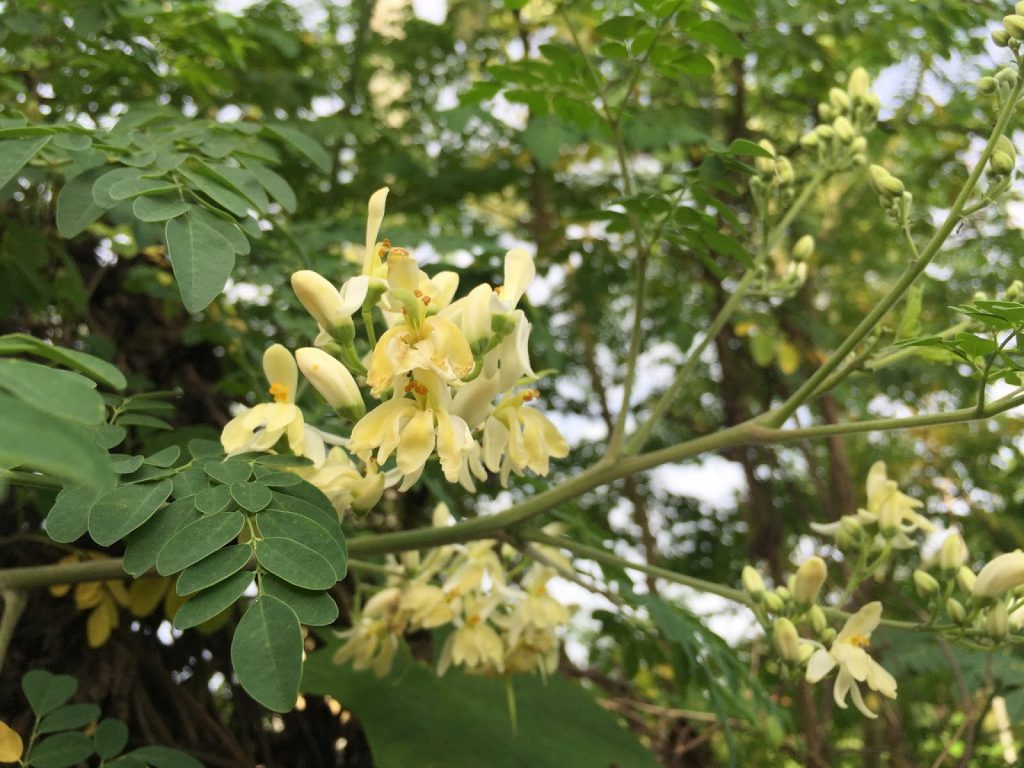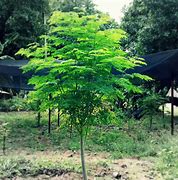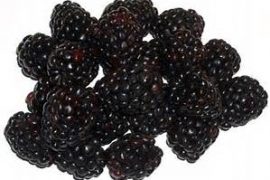
Moringa is a nutrient dense superfood. While there are 14 different species of Moringa, this article focuses specifically on Moringa oleifera. The Moringa oleifera tree originated in India. The flowers, sap, leaves, bark, seeds and root have been used in traditional medicine throughout Southeast Asia. Moringa is now cultivated in many parts of the world such as Central America, Mexico, Africa and South America. It has been used extensively in Ayurveda medicine for more than 4,000 years. It has rightly earned the name “miracle plant” due to its reputation for fighting inflammation and malnutrition.
Why Is Moringa known as the Miracle Tree?
Moringa is a fast-growing tree that is easy to propagate. It is able to be grown from cuttings of tree branches or seeds. The tree is able to survive poor soil and is able to thrive in hot and dry climates. Moringa can survive periods of drought and grows well in many extreme climates. Nutritionally speaking moringa offers:
17x more calcium than milk
10x more vitamin A than carrots
7x more vitamin C than oranges
9x more protein than yogurt
15x more potassium than bananas
25x more iron than spinach.
In 2008 the National Institute of Health called moringa (moringa oleifera) the “plant of the year,” acknowledging that “perhaps like no other single species, this plant has the potential to help reverse multiple major environmental problems and provide for many unmet human needs.”
There are well over 1,300 reports, studies and articles focusing on the benefits of moringa. Just about every part of this amazing plant can be used in some way, whether it is to make a tea, capsule, oil or lotion.
Benefits of Moringa
Moringa can help with a wide variety of conditions, such as:
Anemia
Allergies and asthma
Arthritis and other joint pain, such as rheumatism
Bacterial, viral, fungal and parasitic infections
Cancer
Constipation, diarrhea and stomach pains
Chronic headaches
Diabetes
Edema
Epilepsy
Fluid retention
Heart problems
High blood pressure
Inflammation-related diseases
Kidney stones
Low energy and fatigue
Low sex drive
Stomach and intestinal ulcers or spasms
Thyroid disorders

Top 7 Benefits:
1. Brain Health & Mood Stabilizer-Moringa is rich in compounds and antioxidants that can improve thyroid health, which in turn helps to fight fatigue, mood swings, insomnia and depression.
Moringa is a high protein food with high levels of the amino acid tryptophan which helps to support neurotransmitter function.
2. Balances Blood Sugar– Moringa contains chlorogenic acid, which helps to control blood sugar levels, this allows the cells to take up or release glucose as it is needed. This study in the International Journal of Food Science Technology discovered when diabetic patients consumed moringa with a high carb meal, there were positive effects on insulin levels and blood sugar control.
3. Slows Effects of Aging and Balances Hormones-Study results reveal that supplementing with both amaranth and moringa produced significant increases in antioxidant levels along with significant decreases in oxidative stress markers. Moringa powder contains high levels of anti-aging compounds that reduce the effects of free radicals, oxidative stress and inflammation.
4. Improved Digestive Health– Moringa has been used in many forms of medicine, including Ayurveda, in the prevention and treatment of stomach ulcers, digestive issues, fungal infections, yeast infections, kidney damage and liver disease.
5. Skin Health-Moringa naturally contains antiviral, antifungal and antibacterial compounds that protect the skin from infection. Some common uses include applying the oil to the skin for dandruff, athlete’s foot, gingivitis as well as helping to heal burns and bites.
6. Lower Cholesterol-High cholesterol levels are linked to increased heart disease risk. Many plant-based foods can very effectively reduce cholesterol levels, this of course includes moringa.
7. Reduce Inflammation-While inflammation is a natural response to surgery, infection or injury, long term inflammation is linked to numerous health problems including cancer and heart disease. The main anti-inflammatory compound found in moringa seeds, pods and leaves is isothiocyanates.
Side Effects
Although very few human studies have assessed moringa, those that did showed it to be well tolerated with no side effects reported.
Some studies have shown that high intake of moringa can increase iron in the blood. This may lead to stomach issues and /or hemochromatosis.
Always talk with your healthcare provider before taking any herbal or dietary substance.
Interactions:
There has been some research that these medications may interact with moringa:
- Rifampin, a drug used to treat tuberculosis, along with other medications
- Januvia (sitagliptin), an anti-diabetic medication for type 2 diabetes
In conclusion
Moringa is versatile tree, able to survive harsh drought conditions, It offers wonderful nutrition benefits and can benefit many through its ability to improve digestion, reduce inflammation, boost nutrition levels and help lower cholesterol.
All parts of the moringa tree are useful, including roots, bark, seeds, leaves, flowers and sap.
Consult your practitioner to see if this superfood is a healthy option for you.







